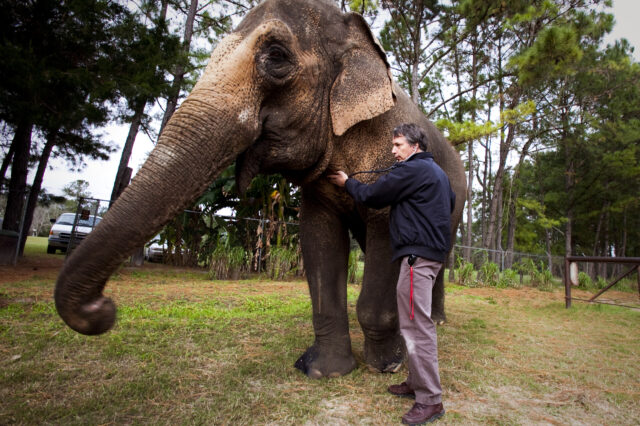UF veterinarian receives scholarship for translational research

Dr. Ramiro Isaza performs a routine physical examination on a female Asian elephant. Elephants are one of many species seen by UF’s zoological medicine service and an example of potential subjects for Isaza’s future studies in public health. (Photo by Sarah Kiewel/University of Florida)
Ramiro Isaza, D.V.M., an associate professor of small animal clinical sciences at the University of Florida College of Veterinary Medicine, has been selected as one of six UF faculty members to receive KL2 Scholarships through UF's Clinical and Translational Science Institute.
Isaza, who currently is chief of the zoological medicine service, is the only veterinarian in UF's first group of KL2 designees. The KL2 program provides training and professional development as well as salary, research and tuition support for a minimum of two years to faculty members who are pursuing a graduate-level degree in a multidisciplinary area of clinical research. Scholars receive an appreciation of diverse clinical research disciplines, an understanding of methodological and analytic concepts necessary to design rigorous clinical research and an opportunity to apply their knowledge through a mentored research experience that leads to future grant proposals.
The program is part of the much broader CTSI, which was established at UF in 2008 as the university developed its programs before receiving a highly competitive and very prestigious Clinical and Translational Science Award from the National Institutes of Health in July 2009.
"Translational medicine as we think of it within the veterinary field is primarily basic research and how we can apply it to animals," said Isaza. "But this program seeks ways of applying our veterinary knowledge to human health. So I've chosen to pursue a master's degree in public health and focus my training and interest on how non-domestic species can cause disease in people."
Isaza said he also will focus on the occupational risks faced by people who such as zookeepers, wildlife professionals and even pet owners who work with non-domestic species.
"I'm pretty well versed in the diseases these animals have, but I want to communicate effectively with the human health professionals about how these animal diseases can impact human health," he said, with the human health professionals about how these animal diseases can impact human health," he said, adding that he felt honored to receive the grant because it afforded him a unique opportunity to cross-train his veterinary students.
"The concept of one health, one medicine is only as good as how well faculty are able to teach the students," he said. "Ultimately I want to teach the students the importance of an MPH degree and how to communicate with human health professionals as well as with clients. This scholarship gives me the opportunity to bridge that gap."
Marian Limacher, M.D., heads up the CTSI's training and professional development program, which includes the KL2 scholarships.
"We're excited about that quality and potential of our first KL2 awardees," Limacher said. "These young professionals have the opportunity to forge new collaborations and develop new insights into research that will improve the health of the population."
About the author
